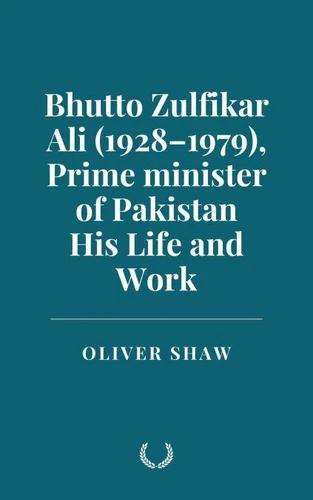Bhutto Zulfikar Ali (1928–1979), Prime minister of Pakistan: His Life and Work
Par :Formats :
Disponible dans votre compte client Decitre ou Furet du Nord dès validation de votre commande. Le format ePub est :
- Compatible avec une lecture sur My Vivlio (smartphone, tablette, ordinateur)
- Compatible avec une lecture sur liseuses Vivlio
- Pour les liseuses autres que Vivlio, vous devez utiliser le logiciel Adobe Digital Edition. Non compatible avec la lecture sur les liseuses Kindle, Remarkable et Sony
 , qui est-ce ?
, qui est-ce ?Notre partenaire de plateforme de lecture numérique où vous retrouverez l'ensemble de vos ebooks gratuitement
Pour en savoir plus sur nos ebooks, consultez notre aide en ligne ici
- FormatePub
- ISBN8230037521
- EAN9798230037521
- Date de parution19/01/2025
- Protection num.pas de protection
- Infos supplémentairesepub
- ÉditeurIndependently Published
Résumé
The life and political career of Zulfikar Ali Bhutto, Pakistan's former Prime Minister, remain a defining chapter in the country's history. This comprehensive examination delves into his legacy as a leader who sought to transform Pakistan through his vision of Islamic socialism, national sovereignty, and democracy. Bhutto's populist agenda, which included economic reforms such as nationalization, land redistribution, and industrial expansion, was aimed at reducing the power of the elite and ensuring greater economic justice.
However, his growing authoritarianism and the political repression that marked his later years contributed to his downfall, culminating in a controversial trial and execution by the military regime of General Zia-ul-Haq. Bhutto's foreign policy, focused on independence from superpowers and the promotion of Pakistan as a leader in the Muslim world, remains a cornerstone of his legacy, as does his commitment to Pakistan's nuclear deterrence.
His approach to governance, though well-intentioned, was marred by contradictions that ultimately led to political instability and military intervention. Despite his tragic end, Bhutto's ideals of social justice, democracy, and sovereignty continue to resonate in Pakistan's political discourse, particularly through the Pakistan People's Party (PPP), which he founded. His vision persists as a point of reference for both admiration and criticism, reflecting the ongoing struggles of Pakistan's democracy and its national identity.
However, his growing authoritarianism and the political repression that marked his later years contributed to his downfall, culminating in a controversial trial and execution by the military regime of General Zia-ul-Haq. Bhutto's foreign policy, focused on independence from superpowers and the promotion of Pakistan as a leader in the Muslim world, remains a cornerstone of his legacy, as does his commitment to Pakistan's nuclear deterrence.
His approach to governance, though well-intentioned, was marred by contradictions that ultimately led to political instability and military intervention. Despite his tragic end, Bhutto's ideals of social justice, democracy, and sovereignty continue to resonate in Pakistan's political discourse, particularly through the Pakistan People's Party (PPP), which he founded. His vision persists as a point of reference for both admiration and criticism, reflecting the ongoing struggles of Pakistan's democracy and its national identity.
The life and political career of Zulfikar Ali Bhutto, Pakistan's former Prime Minister, remain a defining chapter in the country's history. This comprehensive examination delves into his legacy as a leader who sought to transform Pakistan through his vision of Islamic socialism, national sovereignty, and democracy. Bhutto's populist agenda, which included economic reforms such as nationalization, land redistribution, and industrial expansion, was aimed at reducing the power of the elite and ensuring greater economic justice.
However, his growing authoritarianism and the political repression that marked his later years contributed to his downfall, culminating in a controversial trial and execution by the military regime of General Zia-ul-Haq. Bhutto's foreign policy, focused on independence from superpowers and the promotion of Pakistan as a leader in the Muslim world, remains a cornerstone of his legacy, as does his commitment to Pakistan's nuclear deterrence.
His approach to governance, though well-intentioned, was marred by contradictions that ultimately led to political instability and military intervention. Despite his tragic end, Bhutto's ideals of social justice, democracy, and sovereignty continue to resonate in Pakistan's political discourse, particularly through the Pakistan People's Party (PPP), which he founded. His vision persists as a point of reference for both admiration and criticism, reflecting the ongoing struggles of Pakistan's democracy and its national identity.
However, his growing authoritarianism and the political repression that marked his later years contributed to his downfall, culminating in a controversial trial and execution by the military regime of General Zia-ul-Haq. Bhutto's foreign policy, focused on independence from superpowers and the promotion of Pakistan as a leader in the Muslim world, remains a cornerstone of his legacy, as does his commitment to Pakistan's nuclear deterrence.
His approach to governance, though well-intentioned, was marred by contradictions that ultimately led to political instability and military intervention. Despite his tragic end, Bhutto's ideals of social justice, democracy, and sovereignty continue to resonate in Pakistan's political discourse, particularly through the Pakistan People's Party (PPP), which he founded. His vision persists as a point of reference for both admiration and criticism, reflecting the ongoing struggles of Pakistan's democracy and its national identity.























